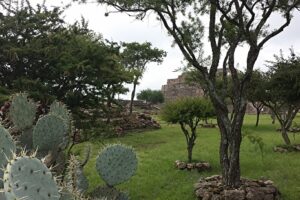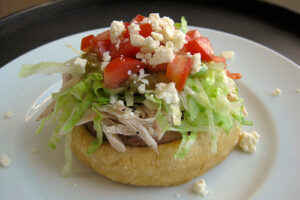Monday marks the halfway point of our stay. The days slip through my fingers—from now on, it is a quick downhill slide till March 31.
The Sounds of San Miguel
At 4 am, the rooster crows. He sounds the alarm again at five and six and seven. The hours are touched with magic and filled with other village sounds. Roof dogs bark. Church bells toll—they do not ring—they toll LOUDLY. The garbage man does ring his bell, announcing his entry into the barrio.
The Garbage Man’s Helpers
The garbage man will pick up your trash, but only if you deliver it into his hands. Small boys vie for the honor and the chance to earn a few pesos. One small boy, no more than four, wishes to handle the whole load by himself. I had to tuck the pesos into his jacket pocket—his eager hands were full of black plastic. He shuns my help till he finds he cannot lift the two sacks more than an inch from the ground—if that. Two older boys come to help him, but I am out of money. They are satisfied with my hand signals that their brother has the money in his pocket and proceed to help him drag the heavy sacks up the cobblestone hill.
Other Sounds
The knife sharpener sounding his haunting whistle does not come this way, at least not when I am home. I miss his lonely wail. Instead, I hear the human singsong cadence of a man calling outside my studio window while I am painting at Sam’s. I cannot understand what he says, but Sam tells me he is selling roasted ears of sweet corn. It is four in the afternoon and time for a snack—I have yet to try this treat.
The Tuesday Market
On Tuesday mornings at the weekly market, the familiar cry of “Moleee, moleee, moleee,” is heard. A man with a bucket full of the rich dark mole is telling the world that you don’t have to make your own. I opt-out of this convenience food and head to the fish mongers table, where I buy some of the biggest and freshest shrimp I’ve seen. The individual weighing my order tells me in Spanish what I owe. I look to Michael for his help in interpreting. The price is $150 pesos per kilo for giant shrimp, and I have purchased the equivalent of four and a half pounds. I pay less than six dollars a pound for what would cost more than sixteen a pound at Central Market.
Extraordinary Days
All of our days are anything but ordinary. Yesterday, a Wednesday, Michael left early for his Spanish lesson at 8:15. I left the house soon after. Isabel arrives at 11 a.m. and sweeps and mops the floors. She also sweeps and mops the rooftop deck, waters the flowers, and sweeps the street in front of our house. Isabel washes our clothes every day, and since there is no drier in the house, she hangs them on the line to dry. She also irons everything—even our underwear. As a result, Michael has thrown away all of his underwear that have any holes whatsoever.
Knowing the house will be in capable hands, I head down the fairly steep cobblestone street of Aldama, passing Juarez Park, where mothers are already busy watching their small children at play. I turn left, walking on a street bordering the Institute Allende. The high rock wall that surrounds the Institute is studded with broken glass shards on the top—a deterrent to all who might consider scaling its heights. Vendors are already busy setting up their portable cooking stations along the street. One merchant will be selling barbacoa tacos—I see two cow’s heads in the back of a pickup. I have read somewhere I must try them. The skinned heads of the cows are a slight turn-off.
Breakfast with a Friend
I proceed right on Ancha de San Antonio, walking past many shops that have not yet opened. They are on my list to explore, but so far, time has eluded me. Finally, I reach my destination at the top of another one of the many hills in this town. I duck through a doorway and find Wendy sitting at an outdoor table under a lace-trimmed umbrella. Waiting. Smiling in greeting. We have breakfast together at La Buena Vida—the good life—how appropriate.
I order chilaquiles with green sauce, change my order to red, and eventually get green anyway. We sit, eating, drinking, and chatting till almost 11 o’clock. A young boy comes to our table and tries to sell us exquisite hand-painted fantasy animals. He has a whole farm. Donkeys, horses, cows, pigs, piglets, turtles. We smile and send him away. However, Wendy, whose husband is an artist in Toronto, really does want one of those animals as a gift for him. We call the young man back, and after more than a little negotiation, she settles on a donkey covered with curls and swirls and dots in colors that would even make a rainbow jealous.
Strolling Through Town
After breakfast, we take time to check out shop after shop as we make our way to the Jardin. Wendy needs money from the ATM, and I want to buy tickets for a play at the Santa Anna Theater Thursday night. The play is called The Perfect Ganesh, and Michael says it is going to be weird, but he has agreed to go anyway. I find the ticket agent sitting on a tree-shaded bench facing the Parroquia. The play is a near sell-out, and I have to change my preferred date to Friday. I have secured two remaining seats on the third row near the entrance. The cost for an evening’s entertainment is $200 pesos—less than $20 USD. We stop in one last shop before I make my way past two more public parks and the Mercado, heading for an afternoon of oil painting.
Artistic Endeavors
Sam has finally given me a key to the apartment building and his studio, so I may come and go as I please. I arrive and find he has forgotten he gave me the key. He is surprised that it is already 2 p.m. It isn’t. I slip into my paint-splashed T-shirt and begin. Currently, I am working on a landscape containing a temple ruin. I receive mixed reviews. One is, “I love your sky and mountains. The trees are great, but the stonework – the stonework is the best.” I look at the painting before me and see flaws.

Wendy says she thinks my niche is in pen and ink abstract drawings. She says, “It is time to leave Sam and try something else.” Sam turns up his nose at my black and white efforts. Michael says practice makes perfect.


I am tucked away in a back room, away from the main studio. After an hour of painting, I hear voices, and the lovely English accent of Sam’s neighbor upstairs, Samantha, called Sam for short. There are male voices, female voices, and a lot of discussion about a model mix-up. I continue to work on my ruin. At 3:30 pm, I begin to clean up and put my things away till my next session. I am to meet Michael for a lecture on Monarch butterflies at the Jacaranda restaurant-theater at 4 pm. I walk into the kitchen and place my used glass in the sink.
Martin is there picking over beans for his night’s dinner. He too, is from England, rents a room from Sam, is the local cacti expert—and a Vegan. He will not eat any form of meat, fish, chicken, or meat byproduct. This includes cheese, eggs, chicken stock, milk, Worcestershire Sauce (contains anchovies), etc. He is continually concocting mixtures of legumes and curry. The kitchen is saturated with the smells of India. Once I asked Martin what I could feed him if he came to dinner at my house. His answer, “Guacamole.” Martin is also a very, very nice person.
A Lecture about Butterflies
I sprint down Sam’s stairs, making my way through town. I dodge traffic and pedestrians, hopping on and off the sidewalk; most often, there is no room for two abreast, and it is my feeling that this is the Mexican’s town, not mine. They have the right of way. Often, we both hop off at once. It is only the Gringos that seem to refuse to budge—I resent them for not giving way to their hosts.
I slip into the seat next to Michael ten minutes before the program begins. We have both paid my admission, and I must go retrieve the money I gave them. Last Friday, we took a fourteen-hour trip to Michoacan to see the Monarch butterflies; now, it is time to see why and how they came to Mexico each year. A fascinating story. We were in the same theater the night before watching De Lovely—the Cole Porter story. For $7 each, we saw a movie, a pre-show biography of Mr. Porter, and were served a wickedly strong Margarita and a bag of popcorn.
Dinner at Home
After the lecture, we walk three long blocks uphill to our home and dinner. We aren’t eating like adults here—we eat like spoiled kids—indulging in whatever we want that is easy and good. It is my week to cook, so I prepare an abundance of boiled shrimp and stir up a cocktail sauce with plenty of horseradish. I mash avocados for guacamole, pour chips into a bowl, dig in the cupboard for some Spanish olives, and stir up a pitcher of Margaritas. Together we cart our feast up to the third-floor deck and watch the sunset over this small hamlet we are calling home for the next six weeks. The warm day turns into a cool evening, and I slip on a poncho, waiting for the dawn of another extraordinary day.







Leave a Reply
Your email is safe with us.